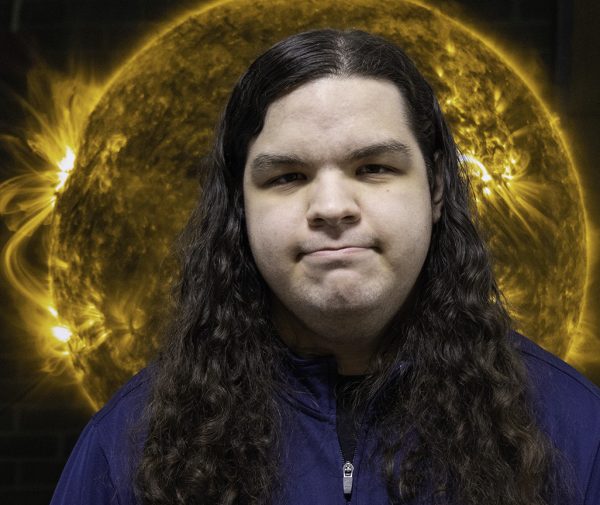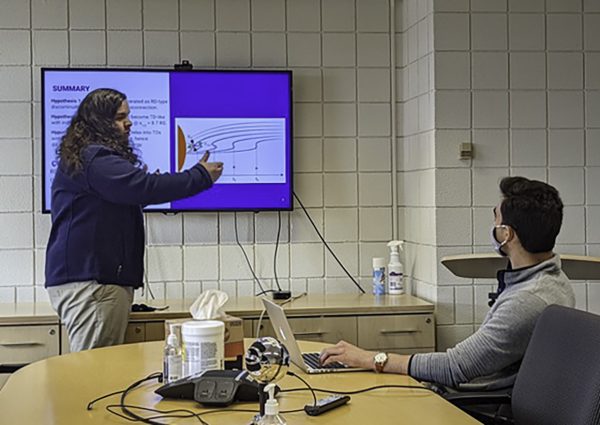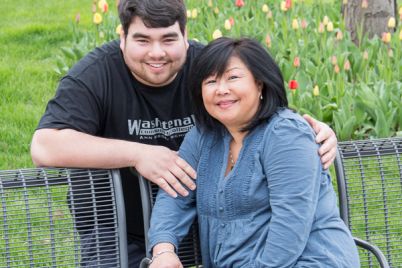Luke Thomas co-authors paper in prominent science journal
By Jordan Scenna
Deputy Editor

WCC pre-engineering student Luke Thomas co-authored a scientific research paper titled “Magnetic Switchbacks Heat the Solar Corona,” which was published in the Astrophysical Journal Letters in October. Paula Farmer | Washtenaw Voice
It’s said that space is the final frontier, but really, there’s nothing final about it. The universe has been expanding ever since the Big Bang, and while we continue to make breakthroughs and increase our knowledge of the cosmos, we may never know it fully. For Luke Thomas, it is precisely this infinite nature, space’s unimaginable vastness, that launched him toward the stars.
“There’s just so much of it [space], and we’re just a tiny speck of sand on the cosmic scale,” Thomas said. “We don’t know how it all works; to quote Star Trek, it’s the final frontier.”
Thomas, a pre-engineering student at WCC, is part of a team from the University of Michigan whose research on solar “switchbacks” was published in “The Astrophysical Journal Letters” in October. The research was made possible by NASA’s launch of the Parker Probe in 2018. The first of its kind, the Parker Probe was able to “touch” the sun, allowing for data gathering of the star’s solar atmosphere for the first time in history.
Thomas’ ability to code made him a good candidate to participate in the study, although he never imagined he’d be a co-author for a paper on the cutting edge of space research, especially considering his early struggles with school.
“It was not something I expected when I started, I just thought I’d be helping out,” Thomas said. “To be a co-author and have my name on something like this is really cool.”
Thomas wasn’t always a stellar student. Circumstances surrounding his early college career caused him to take a more scenic route to scientific stardom. Growing up in Tennessee, Thomas attended East Tennessee State out of high school where he studied computer science, but a financial need forced him to work 45 hours a week as a line-cook at a local steakhouse. With little time to focus on school, his grades plummeted, and he was forced to drop out.
It was a connection Thomas made in high school that helped free him from the stranglehold of scholastic purgatory. His mother was working as an administrative assistant in the Department of Climate and Space Sciences and Engineering at the University of Michigan where she was able to help procure him a summer internship. It was here that he met Mojtaba Akhavan-Tafti, who was working on his doctorate at the time.
Akhavan-Tafti is Thomas’ adviser for the Parker Probe research project, and credits him for much of his success.
“He was the guiding light,” Thomas said. “If he hadn’t been there, I wouldn’t have been able to understand anything.”
When Thomas wanted to go back to school after dropping out of East Tennessee State, it was Akhavan-Tafti, now a member of the research faculty, who he reached out to.
“I needed to get some credentials so that I could get my financial aid to go to school, but I had bad grades and I needed help to get me back in,” Thomas said. “So, I contacted him and asked if he needed help on any research projects.”
A mentor emerges
Akhavan-Tafti was happy to help and gave him a job on the Parker Probe team. Thomas’ position could have been given to post-doctoral fellows who would love to have their names on a high-impact journal, but Thomas’ education was paramount to Tafti, and he didn’t want a lack of money to be a deciding factor.
“His training was important to me. I knew he had potential, he just needed to realize that someone cares about his education, and financial difficulty shouldn’t be the reason you don’t go to school,” Akhavan-Tafti said. “If you fall behind it’s a never-ending struggle.”

Luke Thomas preparing for his presentation at the American Astronomical Society in Seattle with adviser Mojtaba Akhavan-Tafti. Courtesy of Mojtaba Akhavan-Tafti.
Thomas immersed himself in the work. He scoured data captured by the Parker Probe, searching for what they call, “magnetic switchbacks.” Switchbacks are “short magnetic field reversals ubiquitously observed in solar wind.” Robust switchbacks are reversals that meet certain criteria. Luke identified and analyzed these switchbacks wherein Akhavan-Tafti would check his work and bring it to his collaborators.
The sun’s solar atmosphere is even hotter than the surface, known as “the coronal heating problem,” has befuddled scientists since they began studying the fiery star. Akhavan-Tafti and his team proposed that these S-shaped switchbacks, when stretched, release energy, which heats the plasma in the solar atmosphere causing increased temperatures.
Lessons as large as the universe
Thomas’ voyage from college dropout to published researcher is inspirational, but not uncommon, according to Akhavan-Tafti. “Some of us don’t have linear life stories and this often discourages students from pursuing their dreams. “[Luke’s] story is not unique and that’s important for students to realize. Just because there are difficulties facing your education, it should not keep you from pursuing what you truly love.”
Thomas faced his difficulties head on, and he wants other WCC students to know that there are opportunities out there for them too. “This is an opportunity that a lot of other people have, it’s not just because I happen to know Mojtaba.”
“If you’re interested in research, reach out to any research faculty at any university,” he said, “And if they don’t have something to offer you, they can direct you to someone who does.”
Opportunities for WCC students
NASA Community College Aerospace Scholars (NCAS):
- A program for community college students who want to advance their STEM capabilities designed around “three missions” focused on NASA’s mission goals, collaboration, and career pathways.
If interested go to https://www.nasa.gov/stem/murep/projects/ncas.html or contact Professor Daniel Majaess at dmajaess@wccnet.edu.
NASA L’SPACE:
- A free program for undergraduate STEM students comprising two academies, the Mission Concept Academy and the NASA Proposal Writing and Evaluation Experience Academy. Each 12-week program is designed to provide unique, hands-on learning into the dynamic world of the space industry.
For more information go to https://www.lspace.asu.edu/.
Program in Climate and Space Science Observation (PICASSO):
- A University of Michigan program available for undergraduates interested in a potential career in STEM including meteorology, climate, and space sciences. This program is designed to grant opportunities to students who may not have these programs at their college or university.
Learn more at https://clasp.engin.umich.edu/academics/undergraduate-research/reu-clasp/

